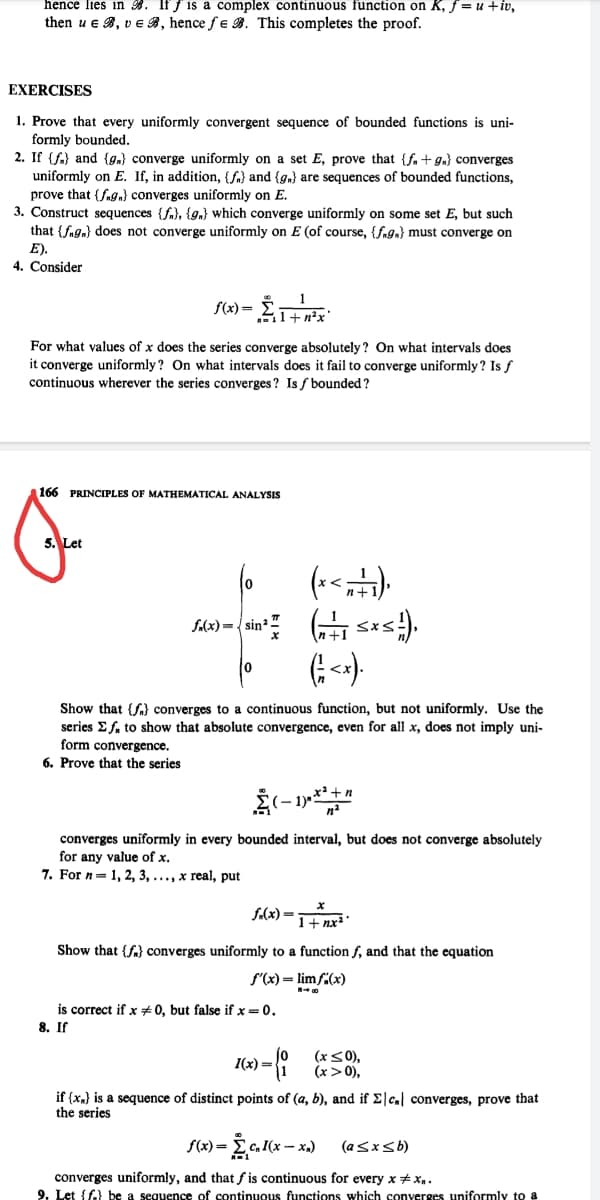166 PRINCIPLES OF MATHEMATICAL ANALYSIS 5. Let (). n+ S(x)={sin? Show that {f) converges to a continuous function, but not uniformly. Use the series E f, to show that absolute convergence, even for all x, does not imply uni- form convergence.
166 PRINCIPLES OF MATHEMATICAL ANALYSIS 5. Let (). n+ S(x)={sin? Show that {f) converges to a continuous function, but not uniformly. Use the series E f, to show that absolute convergence, even for all x, does not imply uni- form convergence.
Algebra & Trigonometry with Analytic Geometry
13th Edition
ISBN:9781133382119
Author:Swokowski
Publisher:Swokowski
Chapter10: Sequences, Series, And Probability
Section10.1: Infinite Sequences And Summation Notation
Problem 74E
Related questions
Question
Q5 Real analysis by Walton rudin
It's solution already sent by u but not cleared .plzz send handwritten in short mathematical form not more there....

Transcribed Image Text:hence lies in B. If f is a complex continuous function on K, f = u +iv,
then u e B, v e B, hence fe B. This completes the proof.
EXERCISES
1. Prove that every uniformly convergent sequence of bounded functions is uni-
formly bounded.
2. If (f} and {gn} converge uniformly on a set E, prove that {fa+ g} converges
uniformly on E. If, in addition, {fa} and {g„} are sequences of bounded functions,
prove that {fugn} converges uniformly on E.
3. Construct sequences {fa}, {g,} which converge uniformly on some set E, but such
that {fng) does not converge uniformly on E (of course, {fa9a} must converge on
E).
4. Consider
f(x) =
For what values of x does the series converge absolutely? On what intervals does
it converge uniformly? On what intervals does it fail to converge uniformly? Is f
continuous wherever the series converges? Is f bounded?
166 PRINCIPLES OF MATHEMATICAL ANALYSIS
5. Let
10
f.(x)={ sin?
Show that {f} converges to a continuous function, but not uniformly. Use the
series E f, to show that absolute convergence, even for all x, does not imply uni-
form convergence.
6. Prove that the series
converges uniformly in every bounded interval, but does not converge absolutely
for any value of x.
7. For n= 1, 2, 3, ..., x real, put
1+ nx²
Show that {f.) converges uniformly to a function f, and that the equation
f'(x)= lim f:(x)
is correct if x * 0, but false if x = 0.
8. If
(x<0),
(x>0),
I(x) =
if (x,) is a sequence of distinct points of (a, b), and if E c. converges, prove that
the series
f(x) =
- x,)
(aSxsb)
converges uniformly, and that f is continuous for every x*x.
9. Let {f.) be a seguence of continuous functions which converges uniformly to a
Expert Solution
This question has been solved!
Explore an expertly crafted, step-by-step solution for a thorough understanding of key concepts.
This is a popular solution!
Trending now
This is a popular solution!
Step by step
Solved in 3 steps

Recommended textbooks for you

Algebra & Trigonometry with Analytic Geometry
Algebra
ISBN:
9781133382119
Author:
Swokowski
Publisher:
Cengage

Algebra & Trigonometry with Analytic Geometry
Algebra
ISBN:
9781133382119
Author:
Swokowski
Publisher:
Cengage